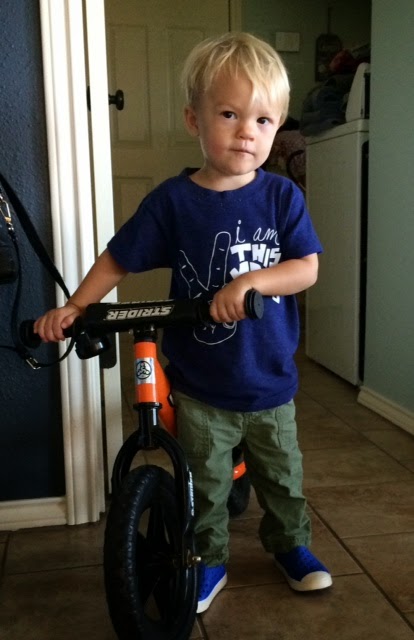Throughout the day those dirty dishes haunt me and I have to get over it.
That greasy window - you know that one where your toddler has smeared hot dog and fingerprints and snot- haunts me. The stack of unpaid bills that sit by the computer haunts me. The planning of the next meal haunts me. The sad dogs that desperately miss their morning sniffs around the neighbor's mailboxes haunt me. And I have to get over it.
My advice to new parents: Embrace the spiral.
Your agenda now happens in spurts throughout the day (or maybe even the week). Your linear mind will ultimately adjust to the curling, winding, and twisting parenthood requires.
And it's all going to be ok.
You don't have to measure yourself by clean dishes, sparkling windows, completed tasks, or worn-out puppy dogs.
All you have to do is be present with your kids.
That's your most important item of the day.
If you're running through to-do lists while you play blocks with your baby, your mind is elsewhere. And the baby knows.
And you know. And you probably feel awful about it.
But that aching pull to make things clean and shiny and prefect again ties knots in your gut and competes with your attention like another child, jealous of your affection to the baby.
And sometimes when you're not expecting it to, your little guru, your toddler, shows you a new way. It's halts you in your tracks, and the hauntings relinquish for a while.
For new parents, the key is to keep these moments of glorious pause stringed together all throughout the day - getting your fix filled, training your mind to replace those yearnings of productivity with a craving to play kitchen with your toddler.
It does get easier my friends. Those ghosts soften and fly away. You will find a way to do what needs to be done and still look in your child's eyes as you authentically say for the eightieth time that day, "Yes, you did build the tower high! I see."
Along the path to parenthood enlightenment, you will be close to finishing the dishes which somehow makes your soul feel good, but you will be halted by baby cries or toddler's pleas to play with him with only three more dirty pans to go.
The days you rush to get a toddler dressed so you can make it to gymnastics on time and you just say F-it while you grab his pants and shoes and throw them in your purse, knowing he will want to get dressed once we get there, will pass. The whole fighting to not get back in that car seat will pass....eventually.
You will exhaust your creative energy on finding ways to cajole him into wanting the things you want, doing the things you want to do when you want to do them. (Sounds a lot like jail time for your toddler, doesn't it?)
All you have to do is be present with your kids.
Those leisurely morning walks in the stroller as preparation for nap time will change into beseeching a little child who wants to run instead of sit. Those moments will turn out to be more waiting for you, sitting on the stairwell, explaining to the dogs why you are holding three leashes but you aren’t going anywhere yet.
Your mind will soon understand how to keep things organized when there’s a tornado in the house - have less stuff.
When every day becomes rush, rush, rush - just whisper your mantra about presence. Your mind will shout, "If you could just get him to sleep, you could scramble like a crazy person to get things accomplished." But don't let that voice overcome your new simple plan.
Luckily, the morale you need to accomplish your new agenda will be sitting in front of you, wearing Planes underwear and an applesauce stained shirt.
During another block building session, he will show you a better agenda, instead of the anxiety, frustration, and hinderances you seem to grab a hold of so tightly.
He will place his little warm hand on your cheek to literally turn your head from the mental check list to look at him. He will plant a tender kiss on your lips.
You will be stunned. You will pause, take a deep breath, and notice how very fortunate you are to have a zen guru as a son.
You will realize the only thing that matters is being present with him.
You have a healthy little boy to love you, a companion on this journey with you, and a limited amount of time to enjoy it all.
You will eventually learn that your old, mark-things-off-the-list self has to evolve into honoring this new, less-orderly life of not always doing. You may no longer get to feel successful at being productive.
It may take a year, and I mean every single, count-down-till-bedtime day to let your heart be at peace with your agenda being altered.
And everyday may still be a challenge to find the right balance of tidiness and sanity, mindfulness and productivity, selfishness and devotion, but thankfully, if we are paying attention, our children will help us find our way.




